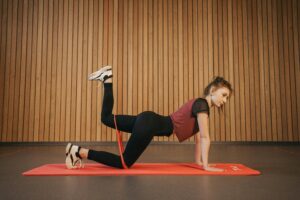
Blood Flow Restriction (BFR) Training: The Next Level of Strength Gains
Blood Flow Restriction (BFR) training is revolutionizing fitness. Learn how this technique boosts muscle growth using light weights for safer, effective workouts.


Sophie is a certified nutritionist specializing in fitness nutrition, creating tailored meal plans to fuel your workouts and enhance recovery.
Achieving your fitness goals requires more than just a solid workout routine. A balanced diet plays an essential role in muscle growth, fat loss, and overall health. Understanding the science behind macronutrients and how they fuel your body can help you optimize your meals to support your fitness journey, whether you’re a beginner or intermediate.
Macronutrients are the building blocks of a healthy diet. These include proteins, fats, and carbohydrates. Each macronutrient serves a unique function in the body, and consuming the right balance can help you achieve better results in your workouts.
Proteins: The most important macronutrient for muscle repair and growth. Protein is made up of amino acids, which are the building blocks of muscle tissue. Consuming enough protein ensures that your muscles recover quickly after a workout.
Good sources: Chicken, fish, eggs, tofu, and legumes.
Carbohydrates: Carbs are your body’s primary energy source. Consuming complex carbohydrates before a workout ensures that your muscles have the glycogen they need to perform at their best. Post-workout, carbs help replenish glycogen stores.
Good sources: Whole grains, sweet potatoes, oats, and fruits.
Fats: Often misunderstood, healthy fats are crucial for hormone production and absorbing fat-soluble vitamins (A, D, E, and K). Omega-3 fatty acids, in particular, help reduce inflammation and improve recovery.
Good sources: Avocados, nuts, olive oil, and fatty fish like salmon.
When you focus on balanced meals, your body performs better, both in and out of the gym. A well-rounded diet helps maintain energy levels, supports muscle recovery, and aids in fat loss. Here’s how each macronutrient contributes to your fitness goals:
Muscle Gain: Protein is the key player in building lean muscle. To maximize muscle growth, aim to consume 0.7 to 1 gram of protein per pound of body weight daily. Carbohydrates provide the energy for strength training, and healthy fats support overall recovery.
Fat Loss: Fat loss occurs when you consume fewer calories than your body burns. Carbohydrates and fats provide energy, but consuming the right amount of protein prevents muscle loss during calorie deficits. A balanced diet will help you shed fat while retaining lean muscle.
Endurance and Energy: Carbohydrates are your body’s preferred energy source during endurance exercises. They keep your glycogen stores full, allowing you to maintain high levels of energy during workouts.
When and what you eat can affect your workout performance and recovery. Understanding meal timing can help you get the most out of your workouts.
Pre-Workout Nutrition: Eat a balanced meal 1-3 hours before exercising, consisting of complex carbohydrates, lean protein, and healthy fats. This will fuel your body with sustained energy and prevent muscle breakdown.
Pre-workout meal example: Grilled chicken with quinoa and steamed vegetables.
Post-Workout Nutrition: After working out, your muscles are depleted of glycogen and need protein to recover. Aim to consume a post-workout meal or shake within 30 minutes to one hour after exercising. Focus on fast-digesting protein, like whey, and easily digestible carbs.
Post-workout meal example: Protein shake with a banana or a turkey sandwich on whole grain bread.
Staying hydrated is just as important as eating the right foods. Water helps regulate body temperature, lubricates joints, and transports nutrients throughout your body. When you’re dehydrated, your muscles fatigue faster, and your performance suffers.
While whole foods should always be your primary source of nutrition, supplements can help fill gaps in your diet. Here are a few that can enhance your fitness results:
Shop top-rated whey protein supplements and take your muscle recovery to the next level.
A balanced diet is the foundation of any successful fitness program. By consuming the right mix of proteins, fats, and carbohydrates, you’ll fuel your body for peak performance, support recovery, and achieve better results. Remember, consistency is key—eating well for a day won’t make a difference, but developing a sustainable nutrition plan will.
Take control of your nutrition and watch your fitness goals become reality. Ready to start? Explore top fitness supplements to optimize your performance and recovery.
Get exclusive workout tips, product recommendations, and motivational content delivered straight to your inbox. Sign up today and take the first step toward a healthier, stronger you!

Blood Flow Restriction (BFR) training is revolutionizing fitness. Learn how this technique boosts muscle growth using light weights for safer, effective workouts.

Burn fat and boost your metabolism with this HIIT workout for beginners and intermediates. Short, intense bursts of exercise for maximum results.

Looking for a full-body strength workout? This beginner and intermediate routine targets all major muscle groups, improving strength and endurance.